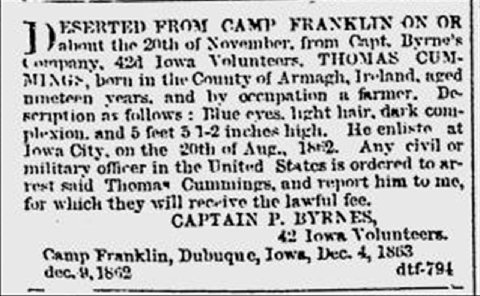Encyclopedia Dubuque
"Encyclopedia Dubuque is the online authority for all things Dubuque, written by the people who know the city best.”
Marshall Cohen—researcher and producer, CNN
Affiliated with the Local History Network of the State Historical Society of Iowa, and the Iowa Museum Association.
CAMP FRANKLIN: Difference between revisions
No edit summary |
No edit summary |
||
| Line 1: | Line 1: | ||
[[Image:deserter1663.jpg|left|thumb|350px|Editorial in the ''Dubuque Herald'' of January 6, 1863 . Image courtesy: Diane Harris.]]CAMP FRANKLIN. See: [[CIVIL WAR]] | [[Image:deserter1663.jpg|left|thumb|350px|Editorial in the ''Dubuque Herald'' of January 6, 1863 . Image courtesy: Diane Harris.]]CAMP FRANKLIN. [[CAMP UNION]] was closed in December due to anti-war sentiment and poor organization. The camp reopened in July "under the name of Camp Franklin, housing the 21st, 27th, 32nd, and 38th regiments. All 120 men of the 21st regiment were Dubuquers and Captain Swivel was their leader. Many had enlisted to avoid the draft--" Many businessmen were concerned about the river trade being damaged by the "Union cause". | ||
[[GRAVES, J K.|J. K. GRAVES]] had a hospital constructed at the camp to treat the wounded and sick soldiers. "During the fall of 1862, outbreaks of typhoid, measles and other diseased occurred, causing 11 deaths and over 200 sick men. Because of bitter feelings between two German companies, there was even a murder. Sick soldiers were cared for by the Soldiers Aid Society and the Dubuque Women's Society. The hospital was originally operated by the [[SISTERS OF CHARITY OF THE BLESSED VIRGIN MARY (BVM)]]. | |||
Governor Kirkwood visited the camp in October 1862 as complaints about patient care REACHED at his office. "A report at Camp Franklin indicated that 193 men had been admitted to the camp hospital, 163 had returned to duty, seven were convalescing, one had been discharged, eight had died and 14 were still in the hospital quite ill." Poor "cooking methods" were declared the cause of many of the complaints. The governor closed the camp and the buildings were dismantled and sold at an auction in January, 1863, for $1,564. | |||
See: [[CIVIL WAR]] | |||
[[CAMP UNION]] | [[CAMP UNION]] | ||
[[Category: Military]] | [[Category: Military]] | ||
Revision as of 16:14, 10 September 2022
CAMP FRANKLIN. CAMP UNION was closed in December due to anti-war sentiment and poor organization. The camp reopened in July "under the name of Camp Franklin, housing the 21st, 27th, 32nd, and 38th regiments. All 120 men of the 21st regiment were Dubuquers and Captain Swivel was their leader. Many had enlisted to avoid the draft--" Many businessmen were concerned about the river trade being damaged by the "Union cause".
J. K. GRAVES had a hospital constructed at the camp to treat the wounded and sick soldiers. "During the fall of 1862, outbreaks of typhoid, measles and other diseased occurred, causing 11 deaths and over 200 sick men. Because of bitter feelings between two German companies, there was even a murder. Sick soldiers were cared for by the Soldiers Aid Society and the Dubuque Women's Society. The hospital was originally operated by the SISTERS OF CHARITY OF THE BLESSED VIRGIN MARY (BVM).
Governor Kirkwood visited the camp in October 1862 as complaints about patient care REACHED at his office. "A report at Camp Franklin indicated that 193 men had been admitted to the camp hospital, 163 had returned to duty, seven were convalescing, one had been discharged, eight had died and 14 were still in the hospital quite ill." Poor "cooking methods" were declared the cause of many of the complaints. The governor closed the camp and the buildings were dismantled and sold at an auction in January, 1863, for $1,564.
See: CIVIL WAR CAMP UNION


